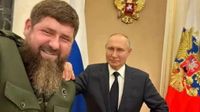In a dramatic turn of events, Ramzan Kadyrov, the long-standing leader of the Chechen Republic, announced his desire to step down from his position, a request that has been met with resistance from Russian President Vladimir Putin. Kadyrov, who has been in power since 2007, indicated during a recent interview that he hopes to be relieved of his duties, stating, "I myself am asking to be relieved of my post. Let my replacement bring their own ideas and vision. I hope my request is fulfilled," according to Chechnya Segodnya.
However, Kadyrov quickly clarified that the final decision rests solely with Putin, emphasizing his loyalty by declaring, "No matter how much I ask, only our Supreme Commander-in-Chief, Russian President Vladimir Vladimirovich Putin, decides. I’m a foot soldier! I’m a team player. If I’m ordered, I’ll follow." This statement underscores the complex relationship between Kadyrov and the Kremlin, where loyalty often dictates political survival.
Putin met with Kadyrov on May 7, 2025, just days after Kadyrov's resignation request. Following their discussion, which reportedly focused on socio-economic issues in Chechnya, Putin praised Kadyrov for his leadership, stating, "As the head of the republic, you can be pleased and proud of the results of the work done in recent years." Despite Kadyrov's public expressions of wanting to resign, Putin ultimately rejected the request, indicating a preference for stability in the region ahead of the upcoming Victory Day celebrations on May 9.
Kadyrov's tenure has been marked by a blend of loyalty to Putin and a strongman image, supported by a personal militia known as the Kadyrovtsy. His leadership style has raised concerns within Moscow, especially in light of recent events, including the mutiny led by Yevgeny Prigozhin. The Kremlin's discomfort with powerful regional leaders like Kadyrov has grown, prompting speculation about potential successors should Kadyrov's health or political standing falter.
Reports have surfaced indicating that Kadyrov is experiencing serious health issues, including complications from pancreatic necrosis, a condition with a high mortality rate. This has led to discussions about who might succeed him, with names like Muslim Khuchiev, the former prime minister of Chechnya, and Apti Alaudinov, a general actively involved in the Ukraine conflict, emerging as potential candidates.
Analysts suggest that Kadyrov's resignation could trigger a power struggle not only within Chechnya but also across the North Caucasus, potentially destabilizing the region at a time when Putin’s grip on power is already being scrutinized. The fear is that a leadership vacuum could lead to a resurgence of opposition forces, including Islamist groups that Kadyrov has suppressed during his rule.
The dynamics of Kadyrov's leadership are further complicated by his familial ambitions. He has been actively promoting his teenage son, Adam Kadyrov, positioning him for a future role in governance. This dynastic approach, however, raises questions about the Kremlin's willingness to support such a transition, particularly if it undermines federal authority in Chechnya.
In a bid to maintain his influence, Kadyrov has framed his resignation request as a strategic move, possibly to test the Kremlin's response or to secure assurances for his family's continued role in Chechen politics. His past resignation requests, made in January 2020, March 2023, and June 2024, suggest a pattern of leveraging his position while simultaneously signaling his vulnerabilities.
The Kremlin's strategy in handling Kadyrov is critical, especially given the historical context of Chechnya's tumultuous relationship with Moscow. Since the end of the second Chechen war, Kadyrov has managed to consolidate power through a combination of loyalty to Putin and brutal repression of dissent. This has allowed him to operate with a degree of autonomy that is now being reevaluated in light of his health and the shifting political landscape.
As Kadyrov's health deteriorates and the question of succession looms, the potential for conflict in Chechnya remains high. Should Kadyrov step down, the ensuing power struggle could attract various factions, including those loyal to Kadyrov and opposition groups that have been marginalized during his rule. The implications of such a shift could extend beyond Chechnya, affecting the stability of the entire North Caucasus region.
In conclusion, while Kadyrov's resignation request has been rejected for now, the underlying issues of health, loyalty, and succession continue to pose significant challenges for both him and the Kremlin. As the situation develops, observers will be watching closely to see how Putin navigates this delicate political landscape and whether Kadyrov's grip on power can withstand the pressures of his health and the ambitions of those around him.





